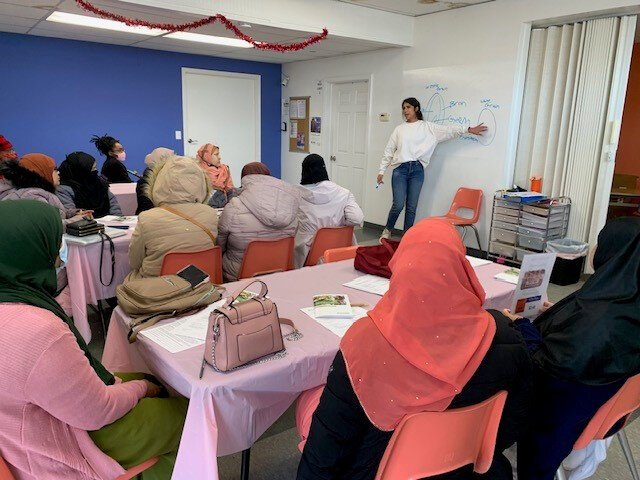Metro Detroit has always been a city of migrants, from the European immigrants who arrived in the mid-19th century.th From the early 19th century to the black community that came here from the American South during the Great Migration, this area has been shaped by people who began their lives in a place far from Michigan.
Once a town closely tied to the Polish community, Hamtramck is now a veritable mix of people from all over the world. It welcomes immigrants from Yemen, Bangladesh, Mauritania, Sudan and, more recently, refugees from the wars in Syria and Ukraine. “Our demographics reflect what’s happening around the world,” says Cathy Maher, executive director of Detroit Friendship House, a nonprofit that serves new Americans in Hamtramck.
First and foremost, Detroit Friendship House serves as a food distribution center. Meeting the needs of people from so many different parts of the world with very different eating habits is a key value and something they work hard to achieve. Chickpeas and rice are always on the shelves because they are suitable for many cultures.
Many of the pantry’s guests are Muslim and require halal proteins, which are difficult to obtain on a food pantry budget, so they have items like lentils, peanut butter and tuna that meet those standards, says Khurshida Hossain, program director at Detroit Friendship House.
Friendship House is a self-select pantry, meaning that pantry guests purchase what they like best from what is available, rather than picking up a bag or box of pre-selected foods that may not meet their needs. Eastern Michigan University helped Friendship House implement a program called SWAP (Serving Wellness at Pantries), which codes food choices as red (less nutritious), yellow (better), and green (best). This helps clients make healthier choices despite language barriers or unfamiliarity with some choices.
Friendship House is the only food pantry in the Detroit area to have implemented the program. “Everyone knows what a stoplight looks like,” Hossain says. “It’s difficult to educate customers on how to choose healthy options, and (the SWAP system) fits our cultural offering.”
SWAP is just one way Friendship House meets community members where they are. Most of the staff and volunteers are from Hamtramck, and many are bilingual. That may seem like a coincidence, but it’s actually one aspect of a trauma-informed approach to food distribution that is central to Friendship House’s work. They have received gold certification from the USDA’s Nutrition Pantry Program, which rates food distributions based on how well they address factors that lead to food insecurity.
A large proportion of the people who come to counseling are war refugees or people seeking asylum because of violence. They carry the deep trauma of their experiences with them. If there is someone at the reception who looks like them or who speaks their language, they can feel more comfortable and safe when they seek help.
“We have to understand that given their situation, we cannot tell them to fend for themselves,” says Hossain. “We started with our environment and gave them the dignity to choose their own food.”
Another approach is the coaching program, which helps people access services when they are ready. Rather than copying the government approach with its strict requirements, people seeking help settling into their new home can meet with a coach who assesses what they need and, most importantly, what they are ready for, and connects them with those services. A follow-up meeting is scheduled to ensure clients were able to access what they needed and to identify future needs.
For example, many women have difficulty attending language courses because they take place in the evenings and they don’t have childcare. Mixed courses are also frowned upon in many cultures. Friendship House offers women-only courses during school hours, so women with children can learn English while their children are at school.
“We found that women tend to be disadvantaged in our community,” Hossain said. “Since I live in the community, I understand the cultural nuances.”
Maher is retiring from Friendship House, but in the future she wants to expand and grow the non-food programs.
“Everyone knows that it takes more than just food to end poverty. And we are developing programs that help break down the barriers that keep people trapped in poverty,” she says.
This story is part of our Nonprofit Journal Projectan initiative focused on nonprofit leaders and programs in the Detroit metropolitan area. This series is made possible by the generous support of our partners, the Ralph C. Wilson Jr. Foundation, Michigan Nonprofit Association And Co.act Detroit.
Did you like this story? Sign up to receive free solutions-based reports in your inbox every week.

